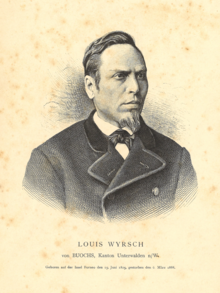Alois Wyrsch (15 June 1825 – 6 March 1888; also known as Louis Wyrsch) was a Swiss politician and a member of the National Council between 1860 and 1872. He was also a member and the president of the executive council in the canton of Nidwalden. Wyrsch was the first member of colour of the National Council.
Alois Wyrsch | |
|---|---|
 | |
| Member of the National Council of Switzerland | |
| In office 1860–1872 | |
| Constituency | Canton of Nidwalden |
| Personal details | |
| Born | 15 June 1825 Borneo, Dutch East Indies |
| Died | 6 March 1888 (aged 62) Buochs, Switzerland |
| Spouses | Franziska Christen (m. 1845)Margareth Zelger (m. 1860) |
Early life and education
editAlois Wyrsch was born on 15 June 1825 on the island of Borneo.[1] His father, Louis Wyrsch, was a Swiss mercenary in the service of the Dutch East Indies in Banjarmasin, southern Borneo, while his mother, Johanna van den Berg, was a Javanese native.[2] Johanna was called njai (maid in Malay) in his father's diaries.[2] Wyrsch was given the name Alois like other male members of the family.[3] He and his sister were both baptised in a Catholic church in Surabaya on Java.[3] At the age of eight, he returned to Switzerland with his father and sister but without his mother, travelling from May to August 1832.[2][4] His father had been wounded and had the right of a pension of a thousand Dutch guilders and earned the title of a Dutch knight of the House of Orange.[3] His father sent Alois to learn Swiss German in Niederrickenbach, in the canton of Nidwalden.[2] Later he attended high school at Engelberg Abbey and in Kreuzlingen.[2] Following his graduation he trained as a miller in Buochs.[2] At 20 years of age, Wyrsch married Franziska Christen.[2] The marriage was not happy and the next year Alois attempted to return to the Dutch Indies.[3] His father tried to enable this, contacting a friend in Utrecht and writing to the people he knew in the Dutch army, in which Alois should have been recruited as a sergeant and not a soldier.[3] After a journey of nine months through Germany and the Netherlands he returned to Switzerland, where he fought with his father in the Sonderbund War in 1847.[2]
Professional and political career
editWyrsch took charge of a mill in Ennetbürgen in 1839, and in 1850 became the owner of another mill in Alpnach.[1] In 1856 he was elected the commander of the Nidwaldean contingent of the Swiss Army by the troops.[2] By then he called himself Louis Wyrsch, like his father.[2] In 1865 he resigned from the mill business to focus on politics.[2]
Wyrsch's role in the Swiss Army made him rather popular and he entered politics. He was first elected a member of the executive council of Nidwalden, then became President of the Executive Council and on 3 December 1860 he was elected to the National Council, becoming its first member of colour.[2][5] In the 1860s he was also elected to the communal assembly of Buochs.[2] As a liberal politician, he faced difficulties in a majority-Catholic conservative canton, and after he supported a new constitution in 1872 he was voted out of office.[2]
Following this he repeatedly and unsuccessfully attempted to win election to the Council of States.[2] Wyrsch's political career on the cantonal level remained successful, and he served as a member of the executive council of Nidwalden for twenty-seven years, including twelve as president.[2]
Personal life
editWyrsch married Franziska Christen, the daughter of a farmer, in 1845. His second marriage, in 1860, was to Margareth Zelger, the daughter of a hospital owner.[1] He had two siblings from Borneo,[2] and a half-brother Jakob from his father's second marriage.[6] Wyrsch died on 6 March 1888 in Buochs.[1]
References
edit- ^ a b c d Aschwanden, Erich (7 March 2013). "Wyrsch, Alois". Historisches Lexikon der Schweiz (in German). Archived from the original on 2 March 2022. Retrieved 2 March 2022.
- ^ a b c d e f g h i j k l m n o p q von Orsouw, Michael (2 March 2022). "From Borneo to Bern". Swiss National Museum. Archived from the original on 2 March 2022. Retrieved 2 March 2022.
- ^ a b c d e Schär, Bernhard C. (8 February 2022). "Switzerland, Borneo and the Dutch Indies: Towards a New Imperial History of Europe, c.1770–1850". Past & Present. pp. 134–167. doi:10.1093/pastj/gtab045. Retrieved 3 March 2022 – via Oxford University Press.
- ^ holensteina (6 July 2021). "Nidwalden meets Borneo". Materialized Histories (in German). Archived from the original on 2 March 2022. Retrieved 2 March 2022.
- ^ Schär, Bernhard C. (15 December 2020). "Wie eine Frau aus Borneo die Gründung der Schweiz prägte". Republik (in German). Archived from the original on 9 August 2021. Retrieved 16 March 2022.
- ^ Christen, Nadia (5 June 2013). "Wyrsch, Jakob". Historisches Lexikon der Schweiz (in German). Archived from the original on 2 March 2022. Retrieved 2 March 2022.